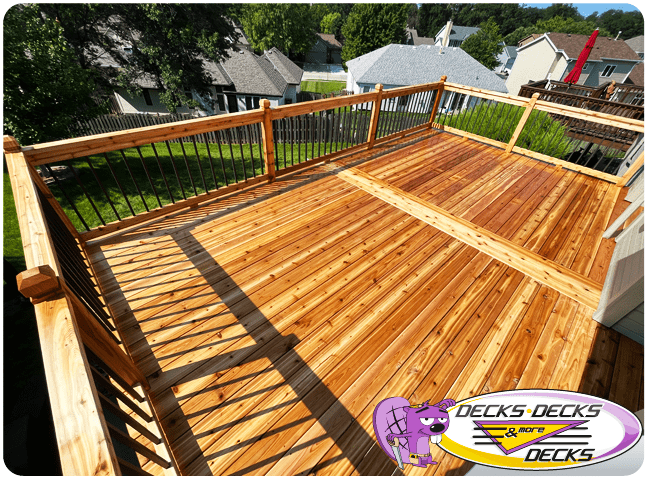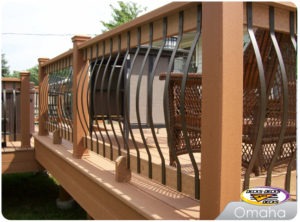Cedar Decking: A Natural Choice for Stunning, Long-Lasting Outdoor Spaces
When it comes to building a beautiful deck that stands the test of time, cedar is a top choice for many homeowners. Known for its natural beauty, durability, and resistance to decay, cedar offers unique benefits, from cedar decking to cedar posts and lumber. Let’s dive into the key points about cedar as a decking material and see how it stacks up against other options.
Why Choose Cedar Decking?
Cedar decking is popular because of its aesthetic appeal and durability. Its natural oils make it resistant to rot and insect damage, a major advantage over untreated woods. Cedar’s warm tones and unique grain patterns also create a natural, inviting look that suits various home styles. It’s lighter than many hardwoods, which makes it easier to work with and install, especially for DIY projects.
Cedar Decking Cost
Cedar decking cost can vary, but it generally falls into a mid-range price point. Factors that affect the price include the quality of the cedar, regional availability, and the thickness or grade of the wood. While cedar may be more expensive than pressure-treated wood, it’s less costly than exotic hardwoods, giving you a beautiful finish without breaking the bank.
Typically, cedar decking costs around $4 to $9 per square foot, depending on these factors. For a more specific estimate, consider consulting with local deck suppliers or contractors who can assess your project’s scope and needs.
Cedar Lumber for Decks and Structures
When building a deck, cedar lumber offers a versatile and long-lasting option for your framing and surface boards. Cedar lumber is available in several grades, with higher grades boasting fewer knots and blemishes. The material is also structurally sound, ideal for supporting decks and heavy loads. Cedar lumber comes in multiple dimensions, allowing you to find the perfect size for posts, beams, or decorative features.

Cedar Posts for Enhanced Stability
Using cedar posts provides a stable foundation for any outdoor structure. Cedar posts are naturally resistant to moisture and decay, making them suitable for ground contact. These posts are often used for deck support, fencing, and railing due to their strength and aesthetic appeal. When properly treated or installed with protection against direct soil contact, cedar posts can last for decades.
Cedar vs. Pressure-Treated Wood
A common comparison when choosing deck materials is cedar vs. pressure-treated wood. Pressure-treated wood is typically more affordable and has been treated with chemicals to resist rot and insects. However, cedar offers a natural alternative without the added chemicals, appealing to those who prefer eco-friendly building materials. Additionally, cedar tends to be more stable than pressure-treated wood, meaning it’s less likely to warp or crack over time. This difference can help ensure a smooth, even deck surface, which requires less maintenance in the long run.
Here’s a quick comparison:
| Feature | Cedar | Pressure-Treated Wood |
|---|---|---|
| Cost | Moderate to high | Low to moderate |
| Aesthetic Appeal | Natural, warm tones | Basic; paint/stain needed |
| Maintenance | Low, but benefits from sealing | Requires regular sealing |
| Lifespan | 15-25 years | 10-20 years |
| Eco-Friendliness | High | Lower (chemical treatment) |
Final Thoughts on Cedar for Your Deck
From cedar decking to cedar posts, this material is a fantastic option for anyone looking to build a lasting, attractive deck. Cedar’s natural resistance to the elements, combined with its beautiful appearance, makes it an ideal choice. While cedar may cost slightly more upfront, it’s an investment that pays off in longevity, minimal maintenance, and timeless appeal.


 Deck balusters (sometimes referred to as spindles) come in a variety of different materials. From cedar, to composite to aluminum, your options are endless. Our professional custom deck designers and builders can help you narrow your choices, and select a baluster to fit your home and decking material. Many aluminum balusters come in different shapes and designs – including arcs, twists, and baskets. Additionally, lighting is also available in aluminum balusters.
Deck balusters (sometimes referred to as spindles) come in a variety of different materials. From cedar, to composite to aluminum, your options are endless. Our professional custom deck designers and builders can help you narrow your choices, and select a baluster to fit your home and decking material. Many aluminum balusters come in different shapes and designs – including arcs, twists, and baskets. Additionally, lighting is also available in aluminum balusters.